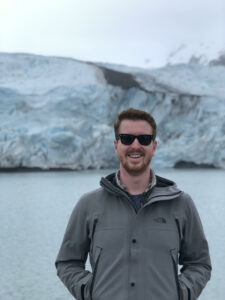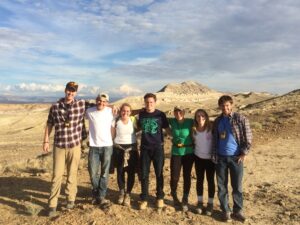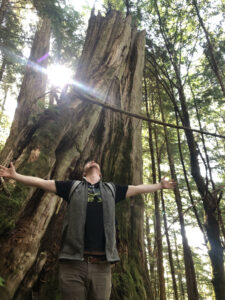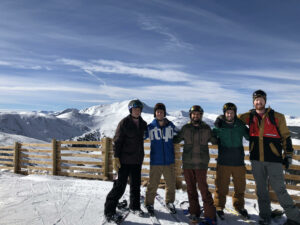Chris Pelland – 2015

Chris in Alaska
Senior Consultant – Financial Services certainly doesn’t muster up any major images of geology. Rocks, soils, and depositional environments may not correlate perfectly with spreadsheets, business strategy, and presentations to a room full of company executives but, funnily enough, you would be surprised just how well the skills learned in a Lafayette geology education translate into the world of consulting. But first, a little background…
My history with geology is a long one which I am always more than happy to talk or write about but in the hopes of keeping you engaged as a reader (and because short and concise stories have never been my strong suit), I’ll try my best to keep it quick. I came to Lafayette intent on studying Civil Engineering with aspirations of, one day, being a structural engineer. However, after participating in the Hawaiian Islands interim course taught by Drs. Malinconico and Germanoski (or, much more commonly, Doc M and Doc G) during my freshman year, I “caught the bug” for geology. What really sealed the deal for me though was, during the spring of my sophomore year while spending a semester abroad in New Zealand, I participated in a geological study focusing on glacial advance throughout a local region of the Southern Alps, working alongside various geology professors and students. Once I came back from my semester abroad I knew that geology was for me so I decided to make the switch from engineering and pursue a B.S. in Geology at the start of my junior year.
For the final two years of my time at Lafayette – now as a geologist – I was able to fully dive in by participating in as many geology courses as possible as

Chris and classmates in Wyoming
well outside opportunities such as conducting summer research prior to my senior year as a part of a Keck Geology Consortium REU (Research Experience for Undergraduates) studying volcanic lava flows in Iceland. Without a doubt though, my favorite (and probably most difficult) experience was Doc M’s Structural Geology course which partnered with Dave’s (that’s Dr. Sunderlin if you’re not familiar with the Geology Department) Sedimentology and Stratigraphy course. From the extensive preparatory classroom and field work learning all the skills and base knowledge needed to analyze and understand the geological processes of the western United States, to the 5 days of fieldwork in Wyoming, to the weeks of post-fieldwork analysis to formulate our final report, Doc M and Dave stretched the boundaries of what I thought could realistically be accomplished in a semester.
Now, despite my love for field work, as a student, I wasn’t all geology and academia. I participated in the crew team for much of my time at Lafayette as well as being a member of the music department’s Percussion Ensemble, Admissions tour guide and interviewing staff, and the college’s Greek life system. If you can’t tell, I had lots of different interests and each provided their own lessons over my four years at Lafayette, none any less important than the next. From better understanding how to manage working in a team of high performing individuals each with their own strong opinions, to being able to sit back and chat with someone whose interests and thoughts are about as different to yours as water is to oil, my Lafayette education taught me everything that a top-notch liberal arts education should, both in and out of the classroom.
Now to the good part, how I ended up where I am now. When I graduated, I took a job in New York City as an underwriter for an environmental insurance company. My goal at the time was to spend a year or two working and then go back to graduate school to pursue a Master’s in Geology. But, as it turns out, the corporate world and I got along quite well so rather than go back to school, I decided to stay at my company and start my career. Now, for those who don’t quite know the job description of an underwriter and only want the cliff notes version, my position involved analyzing risks (primarily environmental in nature, i.e. asbestos abatement contractors, environmental consultants, etc.), determining their exposures and then pricing an insurance policy to fit the risk. The way I described it to my family: say your house floods and you bring a contractor in to dry out your floors, walls, and belongings to make sure mold doesn’t grow. Then, imagine mold does grow because that contractor didn’t do their job correctly. You as a homeowner file a claim and the insurance company (my company) would pick up the tab. While it didn’t stretch all of my geology muscles, it did introduce me to the business world and I quickly realized that many of the skills I’d amassed at Lafayette were quintessential to a successful career in corporate America. And so, after four and a half years as an environmental underwriter, I decided to change it up a bit, moved to Chicago and made the transition into management consulting. Nowadays, my knowledge of the financial services industry comes out more than my knowledge of say, tectonic plates, but nevertheless, my Lafayette education still positively impacts my career to this day.

Chris enjoying the Alaskan Wilderness
My current role as a senior consultant is focused primarily on problem solving. Essentially, my team takes on a project which starts as a simple business question and evolves into thinking through both the strategy of how to solve the specific problem and orchestrating the implementation of the solution. As I mentioned at the beginning, consulting pulls together practically all of the skills you learn from a Lafayette education, especially ones from the geology department. Being adaptive, so that you can walk onto each project and quickly analyze and get up to speed on the specifics of each client. Being analytical, so that you can find and decipher the important data and facts from each business case to determine the best steps forward. And finally, being a strong communicator, so that at the conclusion of a project you can confidently explain to anyone, from the CEO to the intern, what you did, why you did it, and how to move forward.
For those interested in a career in consulting, I would first recommend asking yourself three big questions; first, do you enjoy project based work, second, are you a self-motivator, and third, what’s your opinion on travel? Consulting is certainly not for everyone. It involves a lot of being away from home, a lot of putting yourself in new and uncomfortable situations where you need learn a lot quickly, and it involves a lot of self-promoting. But, if those things are exciting to you, then management consulting might be a great career, even if just for a few years. My best advise would be to speak to anyone you know who might be in the field, or, if you don’t know anyone, explore LinkedIn or reach out to Career Services for any possible connections, regardless of how distant. Then, ask that person to grab a cup of coffee or to have an easy 20-minute phone call and chat about what they do and their experience (by the way, this is my advice for every career, not just consulting). Trust me, people, especially Lafayette alumni, are always happy to chat. And lastly, there’s really no substitute for actually doing it, so if you think the business world might be for you, I would highly recommend working with Career Services to see about securing an externship or summer internship to test out the waters for yourself. Worst case scenario, you find out it’s not the path for you but hey, you have a great resume booster!

Chris and friends at Copper Mountain.
And finally in closing, just a few last pieces of advice that, when looking back at my collegiate career, would have been good to know:
- Connections: they’re important! You never know when people will play a role in your life, either personally or professionally, so it’s worth it to strike up that conversation or grab that cup of coffee. You never know where it might lead!
- Push for what you want: people are always willing to help, but the only person who can advocate best for you is you! If you think something sounds interesting or exciting, let people know. Although, maybe do it tactfully.
- Work isn’t everything: work/life balance is a real thing. Maybe you don’t find a job that checks off everything you were looking for in your life. Welcome to the club. Whether it’s traveling to exotic countries or waking up at 7am on Sundays to watch the next Formula 1 race with friends (wait, not everyone does this?), work is only a piece of your life and there is always room to fulfill your interests outside of the office.
And last…
- If you pick a career with lots of air travel, don’t be 6’8”….planes aren’t that big. “Plane” and simple (pun intended!).
And now the obligatory plug for Ernst & Young: